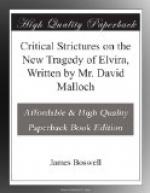[Footnote B: (P. 15) “We heard it once asserted by David Hume, Esq.” On 4 November 1762, in Hume’s house in James’s Court, Edinburgh. “Mr. Mallet has written bad Tragedies because he is deficient in the pathetic, and hence it is doubted if he is the Author of William and Margaret. Mr. Hume said he knew people who had seen it before Mallet was born. Erskine gave another proof, viz. that he has written Edwin and Emma, a Ballad in the same stile, not near so good.” See Private Papers (as in the note preceding this), i. 126-127, or the Limited Edition of Boswell’s London Journal, 1762-1763, McGraw-Hill and Heinemann, 1951, p. 101. Hume protested vigorously, though with good humor, at this breach of confidence, and Boswell wrote a flippant reply (LJ, pp. 206-207, 208-209).]
[Footnote C: (P. 20) “... her Punishment was reserved for the Farce, which for that Purpose was, contrary to Custom, added to the Play.” Stock plays were always followed by an afterpiece, but the afterpiece was in most cases omitted during the first run of a new play. For example, Mrs. Sheridan’s Discovery opened 3 February 1763 and ran for ten nights before an afterpiece was added. The afterpieces presented with Elvira up to 27 January were as follows: 19 January, The Male Coquette (Garrick); 20 January, High Life Below Stairs (Townley); 21 January, Old Maid (Murphy); 22 January, Catharine and Petruchio (Garrick’s adaptation of Shakespeare’s Taming of the Shrew); 24 January, High Life Below Stairs; 26 January, Catharine and Petruchio; 27 January, Edgar and Emmeline (Hawkesworth). But Mrs. Pritchard, who played the Queen in Elvira, seems not to have appeared in any of these afterpieces, and no one of them contains a queen (Dougald MacMillan, Drury Lane Calendar, 1747-1776, Clarendon Press, 1938, pp. 94, 217, 239, 260, 282, 297). Furthermore, if the jest could be understood only with reference to a particular farce, that farce would surely have been named. This is no doubt a case where less is meant than meets the ear. The authors are merely saying that Mallet’s play is badly constructed, and is so ridiculous generally that no one will know when the tragedy ends and the farce begins.]
[Footnote D: (P. 21) “Though in general this Tragedy is colder than the most extreme Parts of Nova Zembla ...” This is perhaps the only passage in Critical Strictures that can be attributed with certainty to one of the three authors. The remark is Dempster’s, and had been made some time before Elvira was presented; in fact, he had applied it originally to Johnson’s Irene. See LJ, pp. 69, 306.]
[Footnote E: (P. 22) “... a Simile of a Bundle of Twigs formed into a Rod ... Mr. Malloch’s original Profession ...” Garrick’s epilogue to Elvira contains the following lines:
A single critick will not
frown, look big,
Harmless and pliant as a single
twig,
But crouded here they
change, and ’tis not odd,
For twigs when bundled up,
become a rod.




